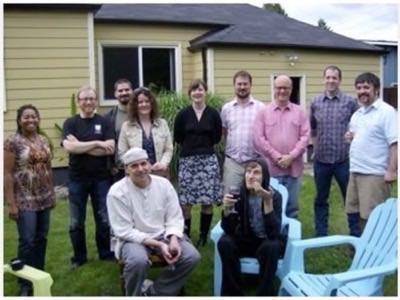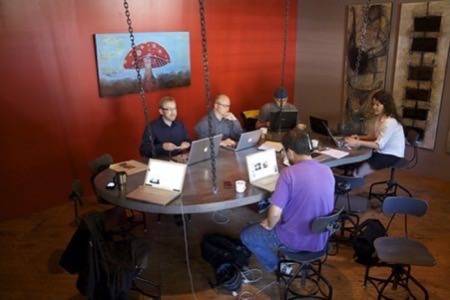We labor under two major misperceptions about technology: Technology from one point in time is better than one further in the past and anything new displaces what came before. When we actively think about these ideas, we may dismiss them. But it’s my contention that these are in fact our unconscious, default positions. (These notions would no doubt be scoffed at by medieval Europeans who spent years desperately dreaming of copping a squat inside like the Romans did. But they are operant in the here-and-now.)

As people who live in and among the very latest of technology, I think it’s a necessary corrective to examine how we use legacy technologies. So, I asked the most first-adopty people I could find, my fellow ReadWriteWeb staffers. What “old fashioned” technology did they employ every day? Some of them did not respond, as they were immersed in a virtual reality safari or traveling in time. But here’s some backtalk from those who did.
Marshall Kirkpatrick, Co-Editor and VP of Content Development
Fireplace; bicycle; iPhone 3G (just kidding, kinda); shovel instead of tiller and gardening at home instead of Food Inc.; text editor instead of word processor; Wi-Fi instead of wireless card; printed newspapers and magazines because they are cool; books; dirty scowl instead of brain-piercing laser beam
I’m not going to say anything about the chickens.
Adrianne Jeffries, Evening News Writer
The most prominent example that comes to mind is handwriting. Pens, pencils and paper are still often more efficient for me than laptops, computers or mobile devices. Examples: grocery lists, writing while field reporting, writing passive-aggressive notes to roommates, sometimes directions to a place. It’s possible to write up to 300 words per minute using shorthand, which I am studying.
So cool I think I’m going to pass out. The world record for shorthand is 350 words per minute and the world record for typing only 212.
Abraham Hyatt, Production Editor

If you go into a hardware store, most hand tools have a sexy, modern version. (Just check out the framing hammers.) But it’s frippery added on to something that hasn’t changed in hundreds of years. I own my great x 4 grandfather’s homemade woodworking plane. It’s identical to wooden planes available today. Same goes for hand saws. I have my great x 2 grandfather’s hand saw – you could have bought it in a store today. It’s technology that has reached a kind of perfection. There’s no way to improve on it; it’s functionality in its purest form.
That’s a powerful idea, the perfection of a technology.
I have a lot of cognitive dissonance about paper vs. digital readers. I wrote a little about it. “The best reason to read books and magazines on paper is because they are not on computers…I did spend the better part of today reading off of screens, and I doubt I’ll ever be able to get away from screen reading. But I’ve got to say, at least at this point in space-time, print is looking better than ever.”
Although the functionality of e-readers is undeniable and the possibilities are interesting, today I picked up “Listen to the Warm” at St. Vinnie’s and it smelled like…victory.
Audrey Waters, News Writer, Startup and Cloud Channels
The Post-it. Also, I prefer a fountain pen.
If you have a beer with Audrey, you will eventually hear about Post-its.

I still prefer a bar of soap to those body wash/poof combos. Ha!
If you have a beer with Sarah, you will eventually hear about soap bars. No, I don’t know. We live on different oceans. But I like to think when she’s hammered she goes on a rant about the “poof” as a sign of the End Times.
Richard MacManus, Founder and Editor-in-Chief
I still use a paper notebook most of the time. I have a paper diary to complement Google Calendar and probably use the former more. I read paper books.
I go to the library (it’s a big building with books in it).
Always a smart-ass this guy. A building is a building with… Wait, what now?
It should surprise no one that a bunch of people who, whatever else they do or seem to be, are in the final analysis writers, would, when it comes to legacy tech, trend heavily toward pens and paper. Technology is not electronics (although electronics is technology.) Technology is us, doing and it has as much of a foundation in our lives as language, religion, philosophy or music.
That connection is so important, in every part of our lives. A connection to what we do, to another person, to family, to a community, to the great men and women of the past who inspire us. We recognize that technology didn’t start with AOL, or with Amiga, or even with the Babbage engine. It started when the first hairbag picked up a rock and broke the end off a coconut or twisted a stick off a sapling and dug out some termites. And it won’t end until we do.
Pantheon photo by Andrew Wales
Photo of weirdies by Marshall
Second photo of weirdies by Abraham

















